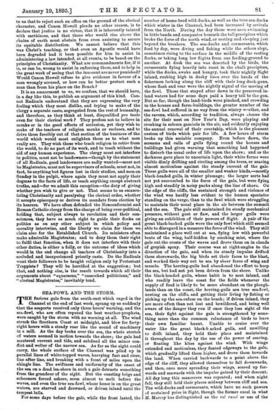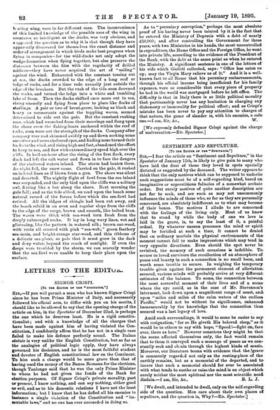SEA-FOWL AND THE STORM.
THE furious gale from the south-east which raged in the Channel at the end of last week, sprang up so suddenly that the seaports received only three hours' warning, and the sea-fowl, who are often reputed the best weather-prophets, were caught by the storm with no warning at all. The wind struck the Southern Coast at midnight, and blew for forty- eight hours with a steady roar like the sound of machinery in a mill. As the day broke over the sea, the whole stretch of waters seemed in motion towards the shore; the gale had mastered current and tide, and subdued all the minor con- Sid and welter of the narrow sea. As far as the sight could carry, the whole surface of the Channel was piled up in .parallel lines of white-topped waves, hurrying fast and close, line after line, and breaking with a front of miles upon the shingle line. The swiftness and uniformity of the onset of the sea on a dead lea-shore in such a gale detracts something from the grandeur of the eight. But the coasting brigs and schooners forced ashore, seem almost to melt before the waves, and even the true sea-fowl, whose home is on the great waters, are starved and drowned, or driven inland until the tempest lulls.
For some days before the gale, while the frost lasted, the number of home-bred wild-ducks, as well as the true sea-ducks which winter in the Channel, had been increased by arrivals from the North. Daring the day these were seen swimming in little bands and companies beneath the tall precipices which broke the force of the north wind, or resting and sleeping just beyond the breakers. The sea-ducks and cormorants, which feed by day, were diving and fishing while the others slept, sometimes rising to the surface in the middle of the resting flocks, or taking long low flights from one feeding-ground to another. At dusk the sea was deserted by the birds, the cormorants flying heavily into roost in the chalk precipices, while the ducks, awake and hungry, took their nightly flight inland, rushing high in dusky lines over the heads of the fishermen lurking along the cliff with their long duck-guns, whose flash and roar were the nightly signal of the moving of the fowl. Those that stayed after dawn in the preserved in- land waters had for some days paid a heavy toll to the gun. But so far, though the land-birds were pinched, and crowding to the houses and farm-buildings, the greater number of the sea-fowl had suffered in no way from the wintry weather, and the ravens, which, according to tradition, always choose the site for their nest on New Year's Day, were playing and croaking in solemn gambols in the air, and evidently enjoying the annual renewal of their courtship, which is the pleasant custom of birds which pair for life. A few hours of storm broke up this sociable company. Even before dawn, the screams and calls of gulls flying round the houses and buildings had given warning that something had happened to disturb the usual order of life upon the shore ; and as the darkness gave place to uncertain light, their white forms were visible dimly drifting and circling among the trees, or soaring almost motionless against the steady current of the gale. These gulls were all of the smaller and weaker kinds,—mostly black-headed gulls, in winter plumage ; the larger sorts had not yet succumbed to the force of the gale, but were flying high and steadily in noisy packs along the line of shore. On the edge of the cliffs, the sustained strength and violence of the wind was hardly less evident to the human spectator standing on the verge, than to the fowl which were struggling to maintain their usual place in the air between the summit and the sea. The gale still maintained its steady mechanical pressure, without gust or flaw, and the larger gulls were giving an exhibition of their powers of flight. A pair of the great black-backed gulls were the only fowl which still seemed able to disregard in a measure the force of the wind. They still maintained a place well out at sea, flying low with powerful beats of the wing, half-hidden by smoking mist, where the gale cut the crests of the waves and drove them on in clouds of greyish spray. Their course was at right-angles to the direction of the gale, and when its steady impulse drifted them shorewards, the big birds set their faces to the blast, and worked their way out to sea by sheer force of wing and muscle. The herring-gulls had abandoned the effort to keep the sea, but had not yet been driven from the shore. Unlike the black-headed gulls, whose habit is to nest inland, and who readily leave the coast for the fields whenever the supply of food is likely to be more abundant on the plough. lands than on the coast, the herring-gulls are true sea-fowl, nesting on the cliffs, and getting their living by fishing or picking up the sea-refuse on the beach ; if driven inland, they are more often than not lost and bewildered, and being well aware of the danger they run if once they lose sight of the sea, their fight against the gale is strengthened by some- thing more than the common reluctance of birds to leave their own familiar haunt. Unable to cruise over the water like the great black-b acked gulls, and unwilling to drift inland, they held their place and maintained it throughout the day by the use of the power of soaring, or floating like kites against the wind. With wings extended and motionless, they floated edgeways to the gale, which gradually lifted them higher, and drove them towards the land. When carried backwards to a point above the edge of the cliff, they allowed themselves to fall downwards, and then, once more spreading their wings, soared up for- wards and seawards with the impulse gained by their descent. All day long this manceavre was repeated; and when night fell, they still held their places midway between cliff and sea. The wild-ducks and cormorants, which have no such powers of sustained poise in flight, though the former excel in what M. Marcey has distinguished as the vol math or use of the
b .ating: wing, were in far different ease. The inconvenience of this limited knowledge of the possible uses of the wing in creatures so intelligent as the ducks, was very obvious, and
igg, sted the question as to why it is that though they have apparently dii-covered for themselves the exact distance and order of arrangement in which birds make best progress when flying in companies- for the wild-ducks not only adopt the wedge-formation when flying together, but also preserve the distances between the files with the regularity of drilled soldiers—they have never acquired the art of "sailing" against the wind. Exhausted with the constant tossing out at sta, the ducks crowded to the edge of a long reef or ledge of rocks, and for a time rode uneasily just outside the edge of the breakers. But the rush of the tide soon drowned the rocks, and turned the ledge into a white and tumbling lake of foam. Then the ducks shifted once more out to sea, rising uneasily and flying from place to place like flocks of starlings. A pair or two of brent-geese, looking as black and heavy as cormorants against the toppling waves, seemed determined to ride out the gale. But the constant rushing seas, which had wrenched from their moorings and flung upon the shore even the fishing-boats anchored within the reef of rJels, soon wore out the strength of the ducks. Company after company rose and skimmed swiftly up and down seeking some smoother and more sheltered spot, and finding none turned their bai ks to the wind, and rising high and fast, abandoned the effort to keep to sea, and flew with extraordinary speed high over the °In's. In half-au-hour after the rising of the first flock, every duck had left the salt water and flown in to face the dangers of the sheltered waters inland. The storm had beaten them. As night fell, the snow came. Carried on the gale, it rushed on in level lines as if blown from a gun. The shore was silent and deserted. The nightly flight of fowl from the sea inland was suspended, and the only bird upon the cliffs was a solitary owl, flitting like a bat along the shore. Next morning the gale fell; and as the tide ebbed, we read upon the beach some natural record of the forces before which the sea-fowl had retired. All the -ridges of shingle had been cut away, and the beach relaid in an even and regular slope from the cliffs to the edge of the surge, brown and smooth, like bolted bran. The waves were thick with sea-weed torn fresh from the deeply submerged rocks. It lay in long wavy lines, wet and glisteuing, like the pattern in watered silk ; brown oar-weed, with roots all crusted with pink "sea-web;" green feathery sea-moss, and bright-orange star-weed, and thin ribbons of a delicate sea-plant, so pale that it must grow in the dark and dtep water, beyond the reach of sunlight. If even the deeps were troubled by the storm, we can scarcely wonder that the sea-fowl were unable to keep their place upon the surface.



































 Previous page
Previous page